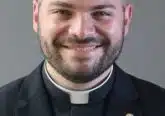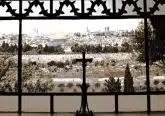CCHD celebrates 41 years of making a difference
By Eileen Connelly, OSU
ARCHDIOCESE — Catholics in the Archdiocese of Cincinnati will have the opportunity to help others escape from the cycle of poverty and empower them to participate in decisions that impact their lives and communities by taking part in the upcoming Catholic Campaign for Human Development (CCHD) The theme for this year’s collection, scheduled for Nov. 20-21, is “Fight Poverty in America. Defend Human Dignity.”
Founded in 1969, CCCD is the domestic anti-poverty social justice program of the United States Conference of Catholic Bishops (USCCB). Two-third of the local collection is sent to the national CCHD offices, most of which is returned to fund organizations operating in the archdiocese, while the remaining one-third of the collection is granted to local agencies on the recommendation of an archdiocesan CCHD committee, explained Tony Stieritz, director of the archdiocesan Catholic Social Action Office. A smaller portion supports the U.S. bishops’ Black and Indian Mission Fund, anti-poverty education efforts in area parishes and schools and administration of the funds.

In the archdiocese last year, contributions to CCHD helped the poor become self-sufficient in a variety of ways, including securing funds for summer jobs for teenagers, winning back stolen wages for low-income workers, saving 230 homes from foreclosure, providing training for 41 young people to become leaders in their communities, helping 105 people enroll in college, 22 earn their GED and assisting 86 individuals find employment or be promoted in their jobs.
“CCHD is about social justice. It’s about getting at the root cause of poverty. It’s about empowering people so they can move forward and improve their own lives,” said Tony Stieritz, director of the archdiocesan Catholic Social Action Office.
The difference CCHD has made in the archdiocese was celebrated Oct. 13 during a gathering at Good Shepherd Parish in Montgomery. Sponsored by the Cincinnati CCHD Committee and Social Action Office, it brought together parish promoters from all over the archdiocese and representatives from nearly all of the local CCHD-funded agencies. It was a chance for Catholics who have generously contributed to the effort over the years to meet directly with the groups putting the funds to work, Stieritz said.
“Just by us being here tonight in the same room is a testament to what it means to be church, a church that is universal and a church that is working for the life and dignity of all people” said Stieritz, as he welcomed those prosent. ‘It’s good to give ourselves the opportunity to celebrate and appreciate the incredible work that CCHD is all about and does.”
On hand to discuss the beginnings of CCHD in the archdiocese were Archie Bruun, who served as director of the then-Social Action and World Peace Office from 1974-1988; and Kathleen Donnellan, regional director of the Dayton office from 1972-75, and current executive director of Catholic Charities Southwestern Ohio. Donnellan noted the significant role the archdiocese has played in the history of CCHD, specifically Archbishop Karl. J. Alter’s institution of a fund to support area anti-poverty efforts — a precursor to today’s annual collection. She noted the shift in thinking over the years that has led to the collection being viewed as a “hand-up instead of a handout,” and said, “If it weren’t for CCHD, our job at Catholic Charities would be so much harder.”
The gathering also included a review of how the local funding process works, presented by Matt Dunn, a member of the archdiocesan CCHD committee. He explained how the committee of 12, compromised of volunteers from area parishes, reviews grant applications, including their strengths and weaknesses, ability for the program to address the root cause of poverty, how many people will be served and that projects under consideration for funding are not contrary to church teaching.
Stieritz felt this explanation was particularly important in light of recent criticism that CCHD has lost its way by funding organization that joined coalitions taking positions contrary to Catholic teaching on issues such as abortion and same-sex marriages. In response, leaders of CCHD have adapted a plan to review and renew the program’s policies. Made public Oct. 26, the plan places greater emphasis on the Catholic identity of the 41-year-old program and renews the U.S. bishops’ commitment to fight poverty in all its forms, said Bishop Roger P. Morin of Biloxi, Miss., chairman of the bishops’ CCHD subcommittee.
A 15-page document titled “The Review and Renewal of the Catholic Campaign for Human Development, outlines the changes and includes 10 commitments under which the program will operate. Bishop Morin said the review allowed CCHD officials to recommit to the program’s founding principles, including its Gospel-based mission of seeking justice rooted in Catholic social teaching and faithful stewardship of human, financial and institutional resources. Some of those efforts will include community organizing activities to find solutions to common problems, such as getting a fire hydrant fixed in an inner-city neighborhood or improving access to quality education for poor children, he said.
Ten months in the making, the review and renewal document was approved by the USCCB’s administrative committee in September. It will be presented to the entire body of bishops during the conference’s semi-annual meeting Nov. 15-18 in Baltimore.
The first listed commitment encompasses the program’s Catholic identity and promises to “emphasize the principles of Catholic social and moral teaching in all CCHD materials and communications.”
The plan calls for CCHD staff responsibilities to be reassigned so that one person will “focus on promoting, safeguarding and monitoring the Catholic identify of CCHD” and checking on the work of funded agencies.
Other commitments include steps to:
• Bring in at least one moral theologian as consultant on the application of Catholic moral teaching on collaboration and cooperation.
• Establish a review board to hear complaints about the activities of funded organizations and decide if a grant should be withdrawn.
• Redesign grant applications so that they include an explanation that CCHD’s mission is based on Catholic social and moral teaching.
• Start a national strategic grant program to “address emerging challenges,” paid for with funds set aside from the national CCHD collection, which is usually taken up in parishes on the weekend before the beginning of Advent.
Other commitments stress the program’s priority for the poor, improving communication about the accomplishments of CCHD-funded programs in local dioceses, strengthening partnerships between the national office in Washington and local dioceses and addressing moral issues related to poverty.
“I believe that review has been a good thing,” Stieritz said. “I think it really affirms what has been going in the archdiocese already. One of the best things about the review process is that it is really intentional about expressing the work that CCHD in Catholic language, so that everybody involved in CCHD, especially those who donate, have a better idea of what it’s all about. A lot of people have been legitimately confused about why the Catholic church supports these groups.”
Stieritz said that the local CCHD application process and documents would be amended to reflect any changes that occur at the national level. “I think it’s important for donors to know that.”
“I also want people to know that if they do have concerns about a specific group, to let our office know about it,” he added. “If there is a violation of fundamental church teaching, it will be investiagated. We take these concerns seriously.”
For more information about CCHD, visit www.usccb.org/cchd or www.catholicsocialaction.org/socialaction, or call 513-421-3131.
CNS also contributed to this story.













